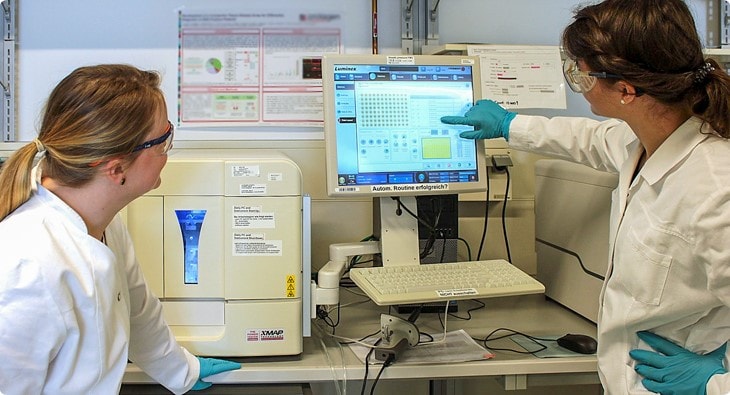For high-throughput autoantibody studies, Oncimmune scientists rely on xMAP® Technology
There is growing recognition that autoantibodies—antibodies directed against someone’s own proteins—represent an exciting class of biomarkers important for revealing interactions between the immune system and cancer.

Many pharmaceutical companies and research institutions looking to study autoantibodies turn to a research service company with deep expertise in this area: Oncimmune®, a rapidly growing UK-based company with about 80 employees in offices around the world. Its ImmunoINSIGHTS® autoantibody profiling service is widely used for immuno-oncology, autoimmune disease, and infectious disease studies.
For this work, Oncimmune scientists have developed a proprietary, immunogenic protein library containing nearly 9,000 antigens; these cover more than 95% of known human antigens. In order to perform high-throughput studies using this library, they have adopted the highly multiplexed, bead-based xMAP® Technology. In addition, Oncimmune has joined Luminex’s Licensed Technologies Group, giving their team access to helpful resources and support, plus the latest features and instrument upgrades.
It’s all in the details
Elena Rupieper, a team leader at Oncimmune who oversees the use of xMAP Technology there, works closely with pharmaceutical and research partners to analyze autoantibody profiles. The studies her team runs include as many as 2,000 blood samples from patients and focus on a specific scientific question, such as how autoantibody profiles change in cancer patients treated with checkpoint inhibitors. Her team has also studied COVID‑19 infections, revealing important information about the immune response triggered in those patients and the elevated levels of autoantibodies seen months after infection, even for patients with mild or no symptoms.
“[xMAP Technology] allows us to rapidly increase our knowledge about immune-related adverse events and disease-modulating therapeutics.”
Analyzing thousands of antigens across hundreds or thousands of samples requires a truly high-throughput pipeline. “xMAP Technology is very important for achieving the level of multiplexing that is necessary for the number of antigens required to get a detailed overview about the patient samples,” Rupieper says. “It allows us to rapidly increase our knowledge about immune-related adverse events and disease-modulating therapeutics by giving us the opportunity to scale up the number of biomarkers we study.”
Target capacity reached
xMAP Technology enables the simultaneous interrogation of as many as 500 analytes from a single low-volume sample. At Oncimmune, Rupieper’s team has incorporated xMAP Technology into a robust pipeline with liquid handling robots to achieve their target capacity.
“Other technology platforms don’t give us the flexibility and throughput,” says Cameron Barnard, chief business officer at Oncimmune. He also appreciates the level of detail that xMAP Technology allows Oncimmune scientists to report back to clients. “I’ve worked in analytical testing for my entire career and I’ve never seen the kinds of results and enthusiastic customer response we get from these studies,” he adds.
To learn other ways Oncimmune is using xMAP Technology, read their poster:
“Multiplexed Autoantibody Profiling of Patients with Metastatic Urothelial Carcinoma Receiving Immune Checkpoint Inhibitors or Platinum‑Based Chemotherapy”
Related Content
- Become a Partner [Webpage]
- Getting Started with xMAP® Technology [Video]
- xMAP Cookbook [Download]
- xMAP Kit Finder: Filter by analyte, species, and vendor [Webpage]